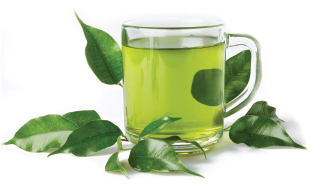The ASCO Post’s Integrative Oncology series is intended to facilitate the availability of evidence-based information on integrative and complementary therapies sometimes used by patients with cancer. Gary Deng, MD, PhD, and Jyothirmai Gubili, MS, present information on the potential health benefits of moderate consumption of green tea and explore clinical trial evidence on one of the most studied natural health products— epigallocatechin-3-gallate, a polyphenol compound from green tea.
Dr. Deng is Medical Director, Integrative Medicine Service; Attending Physician; Clinical Member, Memorial Sloan Kettering Cancer Center, New York. Ms. Gubili is Editor, Integrative Medicine Service, Memorial Sloan Kettering Cancer Center, New York.

Gary Deng, MD, PhD

Jyothirmai Gubili, MS
Scientific Name: Camellia sinensis
Common Names: Chinese tea, green tea extract, green tea polyphenols, epigallocatechin gallate (EGCG)
Overview
CONSUMED WORLDWIDE, green tea is derived from the leaves of Camellia sinensis, an herb cultivated in East Asia, the Middle East, and some parts of Africa. It has a long medicinal history as a stimulant, diuretic, as well as an agent for wound healing and cardiovascular health. More recently, green tea and its extracts have been employed to prevent and treat hypertension, hyperlipidemia, atherosclerosis, and cancer.
The leaves used to obtain green tea, are not fermented but rather steamed or heated after harvest. This process retains the integrity of polyphenols, bioactive compounds to which beneficial effects are attributed.
Green tea is marketed as a dietary supplement in the form of capsules, extracts, and in ointments for external application. Despite its wide consumption for cancer prevention, definitive data are yet unavailable.
The Science

GREEN TEA and its extracts have been the focus of much research over the past few decades. The active constituent is epigallocatechin-3-gallate, which comprises nearly 40% of the total polyphenol content.
Data from clinical studies indicate that regular consumption of green tea may decrease the risk of hypertension1 and positively affect mood.2 It has also been shown to improve glucose tolerance in healthy individuals3 but not insulin sensitivity or glycemic control in people with type 2 diabetes.4 In addition, a large population-based study reported an association between green tea consumption and reduced mortality in patients with cardiovascular disease.5
Green tea extracts, applied topically, were also shown to be safe and effective against external genital and perianal warts in randomized trials.6-8 The U.S. Food and Drug Administration approved one such extract, sinecatechins (Veregen), for treating genital warts.
Investigations into the potential anticancer effects of green tea yielded positive findings, with preclinical, case-control, and prospective cohort studies reporting chemopreventive properties.9-11 In a nonrandomized study, a green tea extract (2,000 mg of EGCG, twice daily for up to 6 months) was reported to produce durable reductions in the absolute lymphocyte count and/or lymphadenopathy in patients with early-stage chronic lymphocytic leukemia.12 Also a case-controlled study found an association between green tea consumption and reduced risk of myelodysplastic syndromes.13
Results from a study of patients with breast cancer after mastectomy and adjuvant radiotherapy suggest that topical EGCG may help relieve radiation-induced dermatitis.14 Moreover, preliminary data show the safety and effectiveness of EGCG against acute radiation-induced esophagitis in patients with lung cancer.15
In randomized trials, supplementation with a blend of green tea, pomegranate, broccoli, and curcumin, daily for 6 months, resulted in a reduction in the rate of prostate-specific antigen (PSA) increase among men with prostate cancer after a PSA relapse postradical treatment.16 However, daily intake of 400 mg of EGCG for 1 year did not reduce the likelihood of prostate cancer.17 In addition, a meta-analysis of epidemiologic studies failed to find any benefits of green tea in preventing stomach cancer18; no association was observed between green tea and the risk of developing malignant lymphoma or multiple myeloma.19 Finally, another study finding suggests that consumption of green tea may increase the risk of breast cancer in postmenopausal women.20 Future randomized trials are needed to resolve the ambiguity, establish the optimal dose, and assess the long-term effects of green tea consumption.
Mechanistic studies indicate that green tea may confer cardiovascular protection by increasing high-density lipoprotein cholesterol, decreasing low-density lipoprotein cholesterol and triglycerides,21 as well as blocking platelet aggregation. The mechanism by which green tea influences blood pressure is thought to be mediated via EGCG modulation of vascular constriction. EGCG induces nitric oxide (NO) production through the activation of endothelial NO synthase, resulting in vasodilation.22
Green tea also exerts neuroprotective effects. A green tea extract was shown to modulate effective brain connectivity during working memory processing in healthy subjects.23 In addition, EGCG inhibited the aggregation of Tau protein, thereby reducing toxicity in neuronal cells.24
The anticancer effects of EGCG are thought to be via inhibition of enzymes involved in cell replication and DNA synthesis, by interfering with cell-to-cell adhesion or inhibiting intracellular communication pathways essential for cell division.25 Concentrations of 30 μg/mL of EGCG and (-)-epigallocatechin were shown to inhibit lipoxygenase-dependent arachidonic acid metabolism in human colon mucosa and colon tumors, which may alter the risk for colon cancer.26 Other studies suggest that EGCG inhibits topoisomerase I (essential for cell survival) in colon carcinoma cells and may hold therapeutic potential.27 EGCG was also shown to inhibit DNA replication in leukemia cell lines28 and to modulate vascular endothelial growth factor leading to apoptosis in leukemic cells.29
OF NOTE
Preliminary clinical trial evidence suggests that epigallocatechin gallate (EGCG), a polyphenolic compound from green tea, may have anticancer effects. Although a dose of 200 mg of EGCG seems to be safe, higher doses may interact with some prescription drugs and may elevate liver enzyme levels. It is also important to distinguish food from concentrated supplements because the dosage varies considerably, which in turn can either confer benefit or cause harmful effects.Additionally, administration of green tea was reported to inhibit ultraviolet B light–induced carcinogenesis30 and, when given before and during carcinogen treatment, to lower the incidence and number of gastric and esophageal tumors in a murine model.31
Adverse Reactions
GREEN TEA is generally considered safe, but because of the caffeine content, excessive consumption can disrupt sleep and cause headaches. A few cases of hepatotoxicity have been associated with green tea extracts with high EGCG levels.32-34
Adverse reactions appear to be dose-dependent. Clinical trials reported the following effects:
- Nausea, abdominal pain, and transaminitis after intake of high-dose EGCG (2,000 mg orally twice per day) in patients with early-stage chronic lymphocytic leukemia12
- Elevation in alanine aminotransferase levels, also after consumption of high amounts of EGCG (843 mg daily for 1 year) by postmenopausal women at risk for breast cancer35
- In another study of EGCG in patients with breast cancer, rectal bleeding (with 800 mg daily), weight gain, indigestion, insomnia (daily dose of 1,200 mg), and liver function abnormality (at 1,600 mg daily) were reported.36
- However, in a study of men with high-grade prostatic intraepithelial neoplasia and/or atypical small acinar proliferation, EGCG (200 mg, twice daily for 1 year) was shown to be safe.37
- Pruritic swelling and darkening of the lower lip following green tea consumption for several years38 and thrombotic thrombocytopenic purpura after taking a green tea supplement for weight loss39 have also been reported.
- When consumed during fasting, green tea extract increased the risk of toxicity in animal studies. Whether it has the same effect in humans is not known.40
Herb-Drug Interactions
ANTICOAGULANTS/antiplatelets: Consumption of large amounts of green tea (0.5–1.0 gallon/d) may provide enough vitamin K to antagonize the effects of anticoagulants and antiplatelet agents. Human data, however, are lacking.41
Bortezomib: EGCG and other polyphenols in green tea can inhibit the therapeutic effects of bortezomib (Velcade) and other boronic acid– based proteasome inhibitors.42
Tamoxifen: EGCG was shown to increase the oral bioavailability of tamoxifen in a murine model. However, the clinical relevance of this finding is not known.43
Verapamil: The bioavailability of verapamil increased significantly in the presence of EGCG, thought to be due to P-glycoprotein inhibition by EGCG.44
Irinotecan: EGCG was reported to inhibit transport of irinotecan and its metabolite SN-38 into biliary elimination, resulting in their enhanced half-life, which can increase toxicity.45
UGT (uridine 5'-diphospho-glucuronosyltransferase) substrates: Green tea modulates UGT enzymes in vitro and can amplify the adverse effects of drugs metabolized by them.46
Cytochrome P450 3A4 substrates: Green tea extract inhibits CYP3A4 and may affect the intracellular concentration of drugs metabolized by this enzyme.47
Acetaminophen: Green tea was reported to elevate acetaminophen-induced hepatotoxicity in a murine model.48
Nadolol: Green tea extract was shown to inhibit the OATP1A2 transporter and may negatively affect the absorption of substrate drugs, such as nadolol.49
For additional information, visit the “About Herbs” website at https://www.mskcc.org/cancer-care/integrative-medicine/herbs/green-tea.
Summary
GREEN TEA, when consumed as a beverage in moderate amounts, may confer health benefits. EGCG, a polyphenolic compound from green tea, is among the most studied natural health products. Preliminary evidence from clinical trials indicates it has anticancer effects. However, taken at high doses, EGCG is associated with transaminitis and may interact with certain prescription drugs. EGCG, at 200 mg twice daily, appears to be a safe dose.37 Patients taking EGCG at higher doses should be monitored for liver enzyme elevations. ■
DISCLOSURE: Dr. Deng and Ms. Gubili reported no conflicts of interest.
REFERENCES
1. Yang YC, Lu FH, Wu JS, et al: The protective effect of habitual tea consumption on hypertension. Arch Intern Med 164:1534-1540, 2004.
2. Brown AL, Lane J, Coverly J, et al: Effects of dietary supplementation with the green tea polyphenol epigallocatechin-3-gallate on insulin resistance and associated metabolic risk factors: Randomized controlled trial. Br J Nutr 101:886- 894, 2009.
3. Venables MC, Hulston CJ, Cox HR, et al: Green tea extract ingestion, fat oxidation, and glucose tolerance in healthy humans. Am J Clin Nutr 87:778-784, 2008.
4. Mackenzie T, Leary L, Brooks WB: The effect of an extract of green and black tea on glucose control in adults with type 2 diabetes mellitus: Double-blind randomized study. Metabolism 56:1340-1344, 2007.
5. Kuriyama S, Shimazu T, Ohmori K, et al: Green tea consumption and mortality due to cardiovascular disease, cancer, and all causes in Japan: The Ohsaki study. JAMA 296:1255-1265, 2006.
6. Gross G, Meyer KG, Pres H, et al: A randomized, double-blind, four-arm parallel-group, placebo-controlled phase II/III study to investigate the clinical efficacy of two galenic formulations of Polyphenon E in the treatment of external genital warts. J Eur Acad Dermatol Venereol 21:1404-1412, 2007.
7. Stockfleth E, Beti H, Orasan R, et al: Topical Polyphenon E in the treatment of external genital and perianal warts: A randomized controlled trial. Br J Dermatol 158:1329-1338, 2008.
8. Tatti S, Swinehart JM, Thielert C, et al: Sinecatechins, a defined green tea extract, in the treatment of external anogenital warts: A randomized controlled trial. Obstet Gynecol 111:1371-1379, 2008.
9. Pisters KM, Newman RA, Coldman B, et al: Phase I trial of oral green tea extract in adult patients with solid tumors. J Clin Oncol 19:1830-1838, 2001.
10. Sun CL, Yuan JM, Lee MJ, et al: Urinary tea polyphenols in relation to gastric and esophageal cancers: A prospective study of men in Shanghai, China. Carcinogenesis 23:1497- 1503, 2002.
11. Tsao AS, Liu D, Martin J, et al: Phase II randomized, placebo-controlled trial of green tea extract in patients with high-risk oral premalignant lesions. Cancer Prev Res (Phila) 2:931-941, 2009.
12. Shanafelt TD, Call TG, Zent CS, et al: Phase 2 trial of daily, oral Polyphenon E in patients with asymptomatic, Rai stage 0 to II chronic lymphocytic leukemia. Cancer 119:363-370, 2013.
13. Liu P, Zhang M, Jin J, Holman CD: Tea consumption reduces the risk of de novo myelodysplastic syndromes. Leuk Res 39:164-169, 2015.
14. Zhu W, Jia L, Chen G, et al: Epigallocatechin-3-gallate ameliorates radiation-induced acute skin damage in breast cancer patients undergoing adjuvant radiotherapy. Oncotarget 7:48607-48613, 2016.
15. Zhao H, Xie P, Li X, et al: A prospective phase II trial of EGCG in treatment of acute radiation-induced esophagitis for stage III lung cancer. Radiother Oncol 114:351-356, 2015.
16. Thomas R, Williams M, Sharma H, et al: A double-blind, placebo-controlled randomised trial evaluating the effect of a polyphenol-rich whole food supplement on PSA progression in men with prostate cancer—The U.K. NCRN Pomi-T study. Prostate Cancer Prostatic Dis 17:180-186, 2014.
17. Kumar NB, Pow-Sang J, Egan KM, et al: Randomized, placebo-controlled trial of green tea catechins for prostate cancer prevention. Cancer Prev Res (Phila) 8:879-887, 2015.
18. Myung SK, Bae WK, Oh SM, et al: Green tea consumption and risk of stomach cancer: A meta-analysis of epidemiologic studies. Int J Cancer 124:670-677, 2009.
19. Ugai T, Matsuo K, Sawada N, et al: Coffee and green tea consumption and subsequent risk of malignant lymphoma and multiple myeloma in Japan: The Japan Public Health Center-based prospective study. Cancer Epidemiol Biomarkers Prev 26:1352-1356, 2017.
20. Li M, Tse LA, Chan WC, et al: Evaluation of breast cancer risk associated with tea consumption by menopausal and estrogen receptor status among Chinese women in Hong Kong. Cancer Epidemiol 40:73-78, 2016.
21. Maron DJ, Lu GP, Cai NS, et al: Cholesterol-lowering effect of a theaflavin-enriched green tea extract: A randomized controlled trial. Arch Intern Med 163:1448-1453, 2003.
22. Lorenz M, Wessler S, Follmann E, et al: A constituent of green tea, epigallocatechin-3-gallate, activates endothelial nitric oxide synthase by a phosphatidylinositol-3-OH-kinase-, cAMP-dependent protein kinase-, and Akt-dependent pathway and leads to endothelial-dependent vasorelaxation. J Biol Chem 279:6190-6195, 2004.
23. Schmidt A, Hammann F, Wölnerhanssen B, et al: Green tea extract enhances parieto-frontal connectivity during working memory processing. Psychopharmacology (Berl) 231:3879-3888, 2014.
24. Wobst HJ, Sharma A, Diamond MI, et al: The green tea polyphenol (-)-epigallocatechin gallate prevents the aggregation of tau protein into toxic oligomers at substoichiometric ratios. FEBS Lett 589:77-83, 2015.
25. Yang CS, Prabhu S, Landau J: Prevention of carcinogenesis by tea polyphenols. Drug Metab Rev 33:237-253, 2001.
26. Hong J, Smith TJ, Ho CT, et al: Effects of purified green and black tea polyphenols on cyclooxygenase- and lipoxygenase-dependent metabolism of arachidonic acid in human colon mucosa and colon tumor tissues. Biochem Pharmacol 62:1175-1183, 2001.
27. Berger SJ, Gupta S, Belfi CA, et al: Green tea constituent (—)-epigallocatechin-3-gallate inhibits topoisomerase I activity in human colon carcinoma cells. Biochem Biophys Res Commun 288:101-105, 2001.
28. Smith DM, Dou QP: Green tea polyphenol epigallocatechin inhibits DNA replication and consequently induces leukemia cell apoptosis. Int J Mol Med 7:645-652. 2001.
29. Lee YK, Bone ND, Strege AK, et al: VEGF receptor phosphorylation status and apoptosis is modulated by a green tea component, epigallocatechin-3-gallate (EGCG) in B-cell chronic lymphocytic leukemia. Blood 104:788-794, 2004.
30. Huang MT, Xie JG, Wang ZY, et al: Effects of tea, decaffeinated tea, and caffeine on UVB light-induced complete carcinogenesis in SKH-1 mice: Demonstration of caffeine as a biologically important constituent of tea. Cancer Res 57:2623-2629, 1997.
31. Yang CS, Lee MJ, Chen L: Human salivary tea catechin levels and catechin esterase activities: Implication in human cancer prevention studies. Cancer Epidemiol Biomarkers Prev 8:83-89, 1999.
32. Mazzanti G, Menniti-Ippolito F, Moro PA, et al: Hepatotoxicity from green tea: A review of the literature and two unpublished cases. Eur J Clin Pharmacol 65:331-341, 2009.
33. Vanstraelen S, Rahier J, Geubel AP: Jaundice as a misadventure of a green tea (camellia sinensis) lover: A case report. Acta Gastroenterol Belg 71:409-412, 2008.
34. Verhelst X, Burvenich P, Van Sassenbroeck D, et al: Acute hepatitis after treatment for hair loss with oral green tea extracts (Camellia Sinensis). Acta Gastroenterol Belg 72:262- 264, 2009.
35. Dostal AM, Samavat H, Bedell S, et al: The safety of green tea extract supplementation in postmenopausal women at risk for breast cancer: Results of the Minnesota Green Tea Trial. Food Chem Toxicol 83:26-35, 2015.
36. Crew KD, Ho KA, Brown P, et al: Effects of a green tea extract, Polyphenon E, on systemic biomarkers of growth factor signalling in women with hormone receptor-negative breast cancer. J Hum Nutr Diet 28:272-282, 2015.
37. Kumar NB, Pow-Sang J, Spiess PE, et al: Randomized, placebo-controlled trial evaluating the safety of one-year administration of green tea catechins. Oncotarget 7:70794- 70802, 2016.
38. Lee JI, Cho BK, Ock SM, et al: Pigmented contact cheilitis: From green tea? Contact Dermatitis 62:60-61, 2010.
39. Liatsos GD, Moulakakis A, Ketikoglou I, et al: Possible green tea-induced thrombotic thrombocytopenic purpura. Am J Health Syst Pharm 67:531-534, 2010.
40. Wu KM, Yao J, Boring D: Green tea extract-induced lethal toxicity in fasted but not in nonfasted dogs. Int J Toxicol 30:19-20, 2011.
41. Taylor JR, Wilt VM: Probable antagonism of warfarin by green tea. Ann Pharmacother 33:426-428, 1999.
42. Goldin EB, Lam PY, Kardosh A, et al: Green tea polyphenols block the anticancer effects of bortezomib and other boronic acid-based proteasome inhibitors. Blood 113:5927-5937, 2009.
43. Shin SC, Choi JS: Effects of epigallocatechin gallate on the oral bioavailability and pharmacokinetics of tamoxifen and its main metabolite, 4-hydroxytamoxifen, in rats. Anticancer Drugs 20:584-588, 2009.
44. Chung JH, Choi DH, Choi JS: Effects of oral epigallocatechin gallate on the oral pharmacokinetics of verapamil in rats. Biopharm Drug Dispos 30:90-93, 2009.
45. Lin LC, Wang MN, Tsai TH: Food-drug interaction of (-)-epigallocatechin-3-gallate on the pharmacokinetics of irinotecan and the metabolite SN-38. Chem Biol Interact 174:177-182, 2008.
46. Mohamed ME, Frye RF: Effects of herbal supplements on drug glucuronidation: Review of clinical, animal, and in vitro studies. Planta Med 77:311-321, 2011.
47. Wanwimolruk S, Wong K, Wanwimolruk P: Variable inhibitory effect of different brands of commercial herbal supplements on human cytochrome P-450 CYP3A4. Drug Metabol Drug Interact 24:17-35, 2009.
48. Salminen WF, Yang X, Shi Q, et al: Green tea extract can potentiate acetaminophen-induced hepatotoxicity in mice. Food Chem Toxicol 50:1439-1446, 2012.
49. Misaka S, Yatabe J, Müller F, et al: Green tea ingestion greatly reduces plasma concentrations of nadolol in healthy subjects. Clin Pharmacol Ther 95:432-438, 2014.

